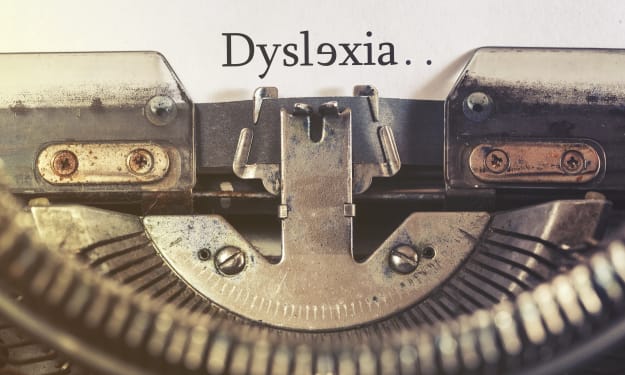Tales from the Dyslexic Side: Part 2
The Dyslexic Simplifier

Dyslexics, it is said, have a reduced working memory; we can’t hold as much “live” information in our heads at once. While your long-term memory can be seen as a hard-drive storing retrievable information, your working memory is like a processor, holding and manipulating the info you are accessing now and allowing you to focus on the task at hand. So, to be able to concentrate on something, we need it broken down into nice manageable pieces. And this is fundamentally what being a copywriter is all about: taking something complicated and translating it into the simple terms we can.
This pruning and simplifying of ideas was something I developed while working as a copywriter but I have since found out that it is something common to dyslexics. It is a strategy we employ, even when it comes to receiving and remembering verbal instructions. One of the most common misconceptions around dyslexia is how it is only considered an impediment to written language and that when it comes to the spoken instructions, we’re able to comprehend everything with no problem. This isn’t true. A long chain of verbal instructions causes a brain freeze. Holding a list of instructions in mind is difficult due to a reduced working memory. For years, I thought I had a good memory (and for certain, not very useful things, I do. I can still recite whole sections from sitcoms I used to watch as a teenager almost word for word) but the truth is that by the time someone gets to the third item on a list, the second has already pushed the first out and is barely hanging in there itself.
Our working memory is what we use to solve problems and make connections with. Many dyslexics have a reduced working memory, making it difficult for us to juggle multiple pieces of information coming at the same time. A series of instructions is like brain bombardment and is virtually impossible to hold in our working memory. Important information is frequently pushed out by less important information which arrives after. This makes notepads and mini-whiteboards indispensable in our house. Whenever I know a series of instructions is coming, I grab my whiteboard and start scribbling. By writing down the list, I can free up my mind to actually think about what I’m being asked to do. By relieving my mind of the necessity of having to remember, it is free to examine what it is being asked to do.
Our working memory is where we hold information while we process it and it is an essential part of learning not just to read but anything really. A poor working memory affects our ability to tie sounds and letters together and form words, and then to remember those words as we attempt to form sentences, and in turn hold the meaning of sentences as we try to read paragraphs.
I specifically remember having this problem at school. At about age ten, during some creative writing exercise, I wanted to write the word “or”. I could hear the sound clearly in my head and this was as much part of the problem as it was the solution. As this tiny phoneme continued to bounce around my brain, I found myself incapable of translating the sound into the correct symbols on the page. I battled with this elusive sound for I don’t know how long, reasoning that it was so tiny in my head it must be tiny when written on paper as well. As elusive as it was, I felt I couldn’t go and ask the teacher, it seemed far too small a word to ask for help with, and I couldn’t tell any of my classmates that I was unable to write such a common everyday word. Admitting that I couldn’t spell the word “or”, something so simple seemed unthinkable at the time.

So, there I sat, my pencil hovering just over the paper, waiting for my brain to tell it which shapes to make to represent that tiny little sound so we could move on, but no instructions came. I was eager to get back to the creative writing process, but this tiny little obstacle as insurmountable as Everest was blocking my way. At the end of the day, I have no idea which letters I used to try and represent that sound. Maybe I discovered how to write the word for metal minerals in rocks or the means by which we propel a boat through the water, or perhaps I discovered the word for great adoration; the abundance of homophones in English hardly makes it easy for dyslexic learners. One of my potential homophone choices that day would one day come back to haunt me when I pronounced ‘awe’ phonetically as “a wee”, much to the amusement of my school friends.
Whether I wrote, or, ore, oar or awe, or even made up a completely new spelling on that day, I don’t remember. But I still remember the trouble and anguish that little conjunction caused me. The troubles posed by a reduced working memory stretch further than a difficulty in matching sounds and symbols though. Growing up and learning means reading more complicated words and sentences. A reduced working memory results in issues with storing and processing information and this results in some of it getting pushed out and a lower comprehension. This makes reading for dyslexics a frustrating chore rather than a pleasure as they are forced to continually reread the same passage for the missing information. From when I was first able to read, I enjoyed it. My passion for stories gave me the motivation to keep going even when the full meaning of what I was reading eluded me. While I was at secondary school, reading fantasy books became the fashion (one I’ve never managed to shake, even now) and I remember being teased by my school mates for skipping over parts of the story or leaving out pages. This was a cause of silent offence for me. The idea that I would ever knowingly skip over even one word without trying to read it was inconceivable. But parts of the story were lost as my brain tried and failed to take in everything my eyes were subjecting it to.
If dyslexia was something I tried to keep secret at school, it was something I tried to ignore when I started work. Unfortunately, this wasn’t possible and together with my reduced working memory, dyslexia came along wherever I went. As I’ve said, long lists (any length, really) are a problem for me, the latter items fight with the former ones for brain space and leave me with nothing more than a wrinkled brow and a nagging feeling I’ve forgotten something. I always liked to think that I had a good memory (have I said that before) and that writing things down was a sign that old age had got you. The need to write things down was a mental weakness I didn’t want to admit to having - not yet anyway. It was only as a dyslexic when I started to adapt to my differences and realise that I needed to interact with the world differently that I discovered the joy of list-making. I now take notes all the time. I grab a notebook whenever someone wants to talk to me. Paper is more reliable than my memory, even if my handwriting can be a little scratchy.
My handwriting has always been something that has annoyed me; it’s untidy and inconsistent and I have always hated writing in front of people. After realising I was dyslexic, I had specialised dyslexic counselling, and one of the things that struck me about my counsellor (she was dyslexic too) was how slow and deliberate she was when taking notes, almost as if she were making a point of doing so. It made me think that her notes weren’t just to aid her memory but how the act of writing them had meaning itself; she wasn’t rushed and was going to be, she needed her time to make notes and she was going to take it. This was so much in contrast to the way that I wrote in front of people. I had always tried to compensate for my slow writing by scribbling as fast as I could. I never wanted to be seen as slow or a burden, so I would get everything down as quickly and as messily as possible before anyone could accuse me of taking too long. Seeing my councillor make her notes in such a slow and deliberate manner so liberating was shocking to me. She was taking her time, not letting herself be rushed by self-doubt or the fear that people would view her as slow or stupid. Perhaps this was intentional, to make me appreciate that I should take my time as well and not be rushed by external pressures. If understanding and comprehension take time, then that is fine. We all need to process things in our own way. Time can be the enemy of the dyslexic, it takes us longer to do simple things and this feeds a fear of being viewed as stupid. Note-taking and not being ashamed to be a note-taker is the most effective way to compensate for a reduced working memory. There are so many simple ways to do it now as well. No longer are we limited to pen and paper. In our house, Google frequently chimes in when I need to do something, whiteboards of various sizes adorn the walls throughout our house reminding me of daily activities and to-do lists. Whiteboards are less permanent than paper and quickly noting down the two or three things I need to remember when I’m being left by myself takes the strain off of my memory, leaves me free to concentrate on what I’m being asked to do rather than trying to mentally juggle a list.
Next: The Dyslexic Student
About the Creator
Jodie Adam
My advice to you is get married: if you find a good wife you'll be happy; if not, you'll become a philosopher.
- Socrates
www.jodieadam.com






Comments
There are no comments for this story
Be the first to respond and start the conversation.